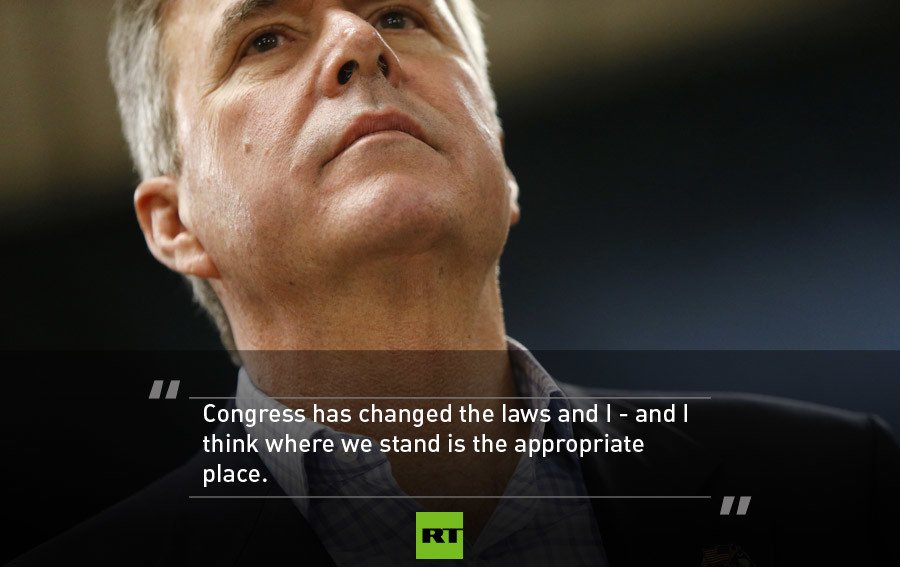‘Nothing should be taken off the table’: Trump supports torture, where do other candidates stand?

Republican presidential hopeful Donald Trump wrote an Op-Ed in support of waterboarding and other enhanced interrogation techniques. It’s not the first time he’s spoken in favor of torture. While some fellow candidates agree with him, others do not.
Waterboarding was an “enhanced interrogation technique” employed in the aftermath of the September 11, 2001 terrorist attacks. But the practice was eventually banned by the George W. Bush administration ‒ after it simulated drowning for its prisoners for years ‒ because waterboarding was deemed to be torture.
Most Republican candidates believe in some version of enhanced interrogation technique, while both Democratic candidates disagree.
On Monday, USA Today published an Op-Ed written by Trump about the use of enhanced interrogation techniques, which include practices such as electric shocks, dogs, nudity, hypothermia, mock executions and more. All of those techniques are specifically banned by the US Army Field Manual.

"Though the effectiveness of many of these methods may be in dispute, nothing should be taken off the table when American lives are at stake," Trump wrote. “The enemy is cutting off the heads of Christians and drowning them in cages, and yet we are too politically correct to respond in kind.”
Trump said that the Op-Ed was designed so that his position on torture was clear to American voters, but it is just one in a line of such declarations, including his comment on doing “a hell of a lot worse” than waterboarding during a February 6 debate.
“I would absolutely authorize something beyond waterboarding,” Trump told George Stephanopoulos on ABC’s ‘This Week’ the next day. “And believe me, it will be effective. If we need information, George, you have our enemy cutting heads off of Christians and plenty of others, by the hundreds, by the thousands.”

Despite his adamant stance against torture, Senator Ted Cruz of Texas not only called for the re-institution of waterboarding during the February 6 presidential debate, but actually justified the practice by saying it didn’t meet the definition of torture.
“Well, under the definition of torture, no, it’s not,” he said. “Under the law, torture is excruciating pain that is equivalent to losing organs and systems, so under the definition of torture, it is not. It is enhanced interrogation, it is vigorous interrogation, but it does not meet the generally recognized definition of torture.”
He did promise, however, that he would "not bring it back in any sort of widespread use."
Under Cruz’s definition, the Intercept’s Alex Emmons noted, the treatment his father endured in a Cuban prison would not qualify as torture. The elder Cruz was imprisoned before the Cuban Revolution, where he was beaten, kicked and had his teeth bashed in, among other horrors, the Texas senator said in his 2015 book.

Former neurosurgeon Ben Carson believes that steps to ban torture amount to caving to the pressure of political correctness, and is a dangerous precedent when dealing with an enemy that doesn’t follow the Geneva Convention.
“I’m not one who is real big on telling the enemy what we’re going to do and what we’re not going to do,” Carson said on ‘This Week’ in November. “I don’t see where that accomplishes anything for us.”

Florida Senator Marco Rubio believes that terrorism cases do not require the same legal standards of traditional law enforcement.
“Well, when people talk about interrogating terrorists, they’re acting like this is some sort of law enforcement function,” he said during the New Hampshire debate. “Law enforcement is about gathering evidence to take someone to trial, and convict them. Anti-terrorism is about finding out information to prevent a future attack so the same tactics do not apply.”
He also believes that the Guantanamo Bay Detention Center should not only remain open indefinitely, but should receive new prisoners.
“If we capture terrorists, they’re going to Guantanamo, and we will find out everything they know,” Rubio said in a January GOP presidential debate.

Ohio Governor John Kasich was pressed about his position on torture by a New Hampshire resident after the February debate in that state. He spoke of the TV show ‘24’, noting that “there could be a Jack Bauer moment [where] I gotta find out what the heck is going on.”
Yet Kasich also said that, since his 18-year stint on the House Armed Services Committee, he has been advised that torture often doesn’t work.

Former Florida Governor Jeb Bush has long sought to distance himself from many of his older brother’s presidential policies. When it comes to enhanced interrogation techniques, however, he has never quite been able to separate himself.
“I don’t want to make a definitive, blanket kind of statement,” Bush said in August 2015, when asked about repealing an executive order banning torture.
Yet in the February 6 debate, Bush was the only Republican candidate to speak out against the practice.
Days later, on February 9, Senator John McCain (R-Arizona), who ran for against now-President Barack Obama in 2008, condemned the torture rhetoric of the current crop of GOP hopefuls. The 79-year-old former Navy pilot was captured and tortured by the Viet Cong during the Vietnam War.
“These statements must not go unanswered because they mislead the American people about the realities of interrogation, how to gather intelligence, what it takes to defend our security and at the most fundamental level, what we are fighting for as a nation and what kind of nation we are,” McCain said on the Senate floor.
The topic of torture has not been a factor in the Democratic race, in part because the two candidates stand firmly against the practice, and those stances have solidified over time.

When the Senate Intelligence Committee released its investigation on the CIA’s use of enhanced interrogation in December 2014, Senator Bernie Sanders (I-Vermont) spoke out strongly against the practice.
“A great nation must be prepared to acknowledge its errors. This report details an ugly chapter in American history during which our leaders and the intelligence community dishonored our nation’s proud traditions,” he said in a statement. “Of course we must aggressively pursue international terrorists who would do us harm, but we must do so in a way that is consistent with the basic respect for human rights which makes us proud to be Americans.”
The self-described democratic socialist followed up that statement in June, when he voted in favor of a Senate amendment that sought to "reaffirm the prohibition on torture."

In December 2014, former Secretary of State Hillary Clinton spoke out against waterboarding during a speech accepting an award from the Robert F. Kennedy Center for Justice and Human Rights.
“America is at our best when our actions match our values,” she said, adding that she was “proud” to be a part of the Obama administration when the current president banned such tactics in a 2009 executive order.
Terrorist attacks “not only break hearts but should steel our resolve and underscore that our values are what set us apart from our adversaries,” Clinton said.












